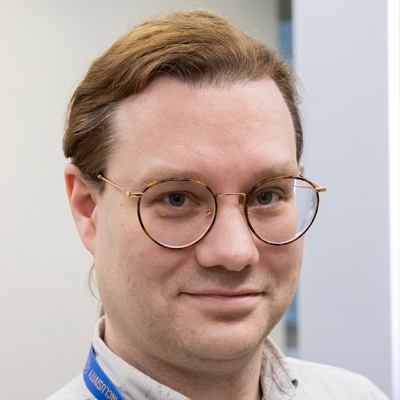Tuesday March 17, 2026 – Brendon Seale, PhD
Brendon Seale, PhD
Scientific Manager – Proteomics
Lunenfeld-Tanenbaum Research Institute
Commercial advantage: Reproducibility and speed of commercially prepared nanoflow chromatography columns for the proteomics core lab
Abstract
Biosketch
Brendon Seale earned a PhD in Bioanalytical Chemistry from the University of Toronto under Professor Aaron Wheeler where he developed methods for reducing protein and peptide sample complexity using automated microfluidics and differential mobility spectrometry in line with mass spectrometry. Following his PhD, he completed a 2-year Mitacs ELEVATE post doctoral fellowship with Derek Wilson from York University & SCIEX, where he developed ion mobility methods for the analysis and understanding of peptides and proteins in the gas phase. Afterwards he joined the lab of Anne-Claude Gingras of the Lunenfeld-Tanenbaum Research Institute as a research scientist working on the miniaturization of proximity protein interaction methods before being promoted to Scientific Manager of the Proteomics Core facility of the Network Biology Collaborative Centre at the LTRI. As Scientific Manager, he develops and implements advanced technologies for sample prep and mass spectrometry, designing workflows that make complex protein analysis more efficient, precise, and impactful for our research. He is also responsible for the training and education of graduate students in biology in the function, use, and care of various mass spectrometers.
Date
Date(s) - March 17, 2026
6:00 pm - 8:00 pm
Emplacement / Location
Université de Montréal - Campus MIL (Beer and pizza at 18h, conference at 19h in A-4502)
Groupe de discussion en spectrométrie de masse de Montréal (GDSMM)
Le groupe de discussion sur la spectrométrie de masse de Montréal (GDSMM) est un organisme à but non lucratif qui offre un forum favorisant les interactions locales, nationales et internationales entre les scientifiques oeuvrant en spectrométrie de masse. Le GDSMM organise des séminaires scientifiques et des forums de discussion présentant les derniers développements en recherche fondamentale et appliquée en spectrométrie de masse. Une réunion annuelle du GDSMM qui regroupe les étudiants et les post-doctorants a lieu à Montréal chaque printemps et offre une opportunité unique de réseautage en plus d’accroitre la visibilité et la sensibilisation aux contributions locales en spectrométrie de masse.
Montreal mass spectrometry discussion group (MMSDG)
The Montreal mass spectrometry discussion group (MMSDG) is a not-for-profit organization that provides a forum to promote local, national and international interactions among scientists involved in mass spectrometry. MMSDG sponsors scientific seminars and forums to present the latest developments in basic and applied research in mass spectrometry. An annual MMSDG meeting that regroups students and postdoc is held every spring in Montreal, and provide a unique networking opportunity to participants and enhance the visibility and awareness of local contributions in mass spectrometry.
 |
|
 |
 |
 |
 |
 |
 |
 |

|
 |
|

|
|

